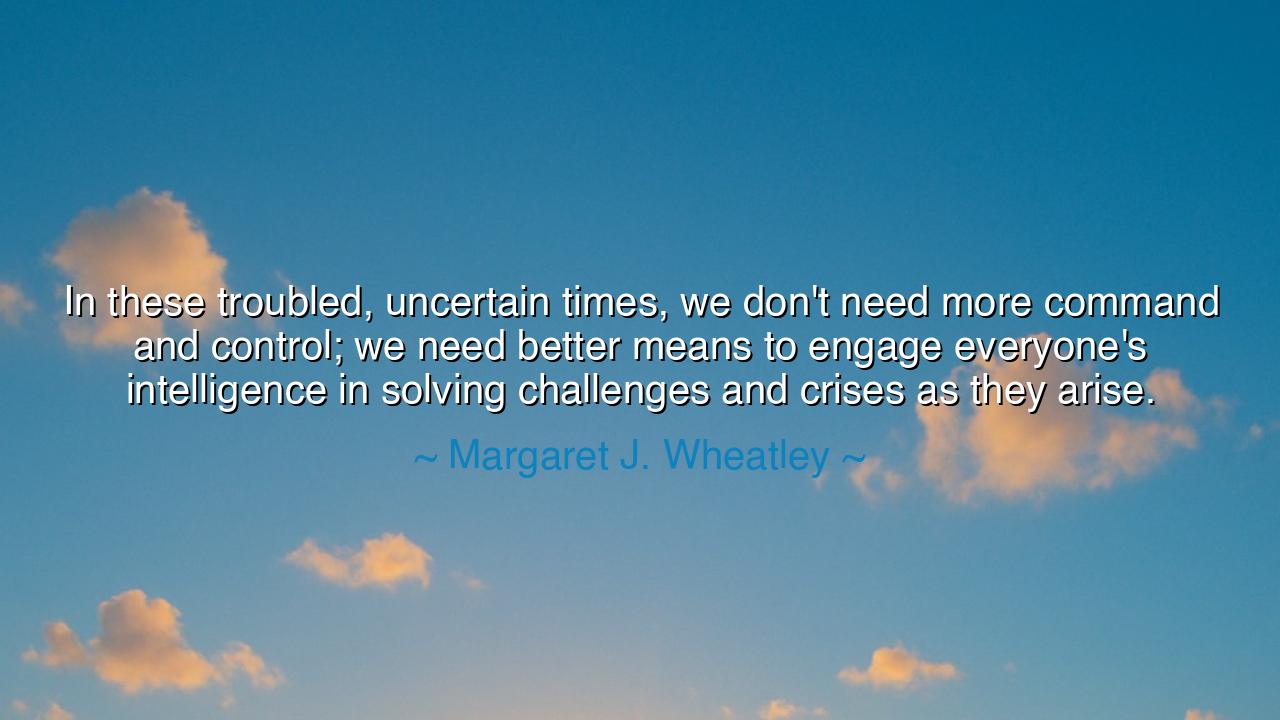
In these troubled, uncertain times, we don't need more command
In these troubled, uncertain times, we don't need more command and control; we need better means to engage everyone's intelligence in solving challenges and crises as they arise.






The words “In these troubled, uncertain times, we don’t need more command and control; we need better means to engage everyone’s intelligence in solving challenges and crises as they arise,” were spoken by Margaret J. Wheatley, a thinker of deep insight and gentle authority—a voice of leadership grounded not in domination, but in understanding. In these few lines, Wheatley offers a timeless lesson that echoes across the ages: that true strength in chaos does not come from rigid hierarchy or fear-driven authority, but from the collective intelligence, creativity, and courage of people united in purpose. Her words are both a critique of the old ways of control and a call to awaken the sleeping wisdom within all hearts.
Wheatley, a scholar of organizational behavior and leadership, wrote these words in a time when the world—political, economic, and ecological—was trembling under the strain of complexity. Yet her wisdom transcends its moment, for every age of uncertainty has been tempted to answer fear with control. In kingdoms, corporations, and governments alike, the instinct to command—to tighten the grip—has often seemed the path to stability. But Wheatley, like the philosophers of old, saw that in times of change, the greatest danger is not disorder itself, but the blindness that comes from refusing to trust others. To lead by command is to stifle the very intelligence that could bring renewal.
This truth has echoed since the dawn of civilization. Consider the tale of Pericles in ancient Athens, who led not as a tyrant, but as a collaborator of his people. During times of war and political turmoil, he turned to the assembly, inviting voices from all walks of life to share counsel. He understood that democracy was not a structure of control, but a living conversation—a weaving of wisdoms. Under his leadership, Athens reached its golden age, not because of one man’s vision, but because he engaged the intelligence of many. When people are trusted to think, they begin to care; when they are empowered to act, they create miracles.
By contrast, history is littered with the ruins of those who ruled by command and control. Empires built on fear may last for a season, but they crumble from within, for the human spirit was never meant to obey without meaning. The armies of Alexander, the bureaucracies of Rome, the regimes of modern dictators—all sought order through obedience, but none could withstand the test of time. The heart that is silenced grows bitter; the mind that is ignored grows dull. Only when people are invited to share in the labor of problem-solving—when they feel their intelligence matters—can a society endure its storms and rise renewed.
Wheatley’s insight speaks also to our personal lives. For each of us, at times, becomes a ruler over our own small kingdoms—our homes, our workplaces, our relationships. In fear, we try to control outcomes, to command others, to bend life to our will. But the wise learn that control is brittle, while collaboration is living. To engage others’ intelligence is to honor their humanity, to say: “You, too, carry a spark of wisdom; let us find the path together.” In this humility lies true leadership, and in this shared effort lies the seed of resilience.
Let us look also to a modern story—the story of the Apollo 13 mission. When disaster struck in the cold void of space, no single commander could solve it alone. It was through the combined intelligence of engineers, scientists, and astronauts working as one that disaster became triumph. Each voice mattered; each mind contributed to survival. This is the power Wheatley speaks of—the miracle that occurs when leadership transforms from control to collaboration, when every soul is invited to bring forth its brilliance.
Thus, her teaching is clear: in times of turmoil, trust the many, not the few. Wisdom is not the property of rank or title—it lives in the shared consciousness of a people. The leader who commands silences the very chorus that could save him; the one who listens creates harmony from chaos. To follow Wheatley’s wisdom is to build families, organizations, and nations that breathe, adapt, and grow together. It is to remember that intelligence is not a flame kept in one hand, but a fire that grows brighter when shared.
So, O seeker of understanding, let this be your guiding principle: do not lead through fear—lead through trust. Do not silence others’ wisdom—awaken it. In your home, in your work, in your community, invite collaboration instead of control. Ask, listen, empower. For as Margaret J. Wheatley reminds us, the salvation of every age lies not in the commands of the powerful, but in the collective intelligence of the willing, who, together, can turn uncertainty into possibility, and chaos into creation.






AAdministratorAdministrator
Welcome, honored guests. Please leave a comment, we will respond soon